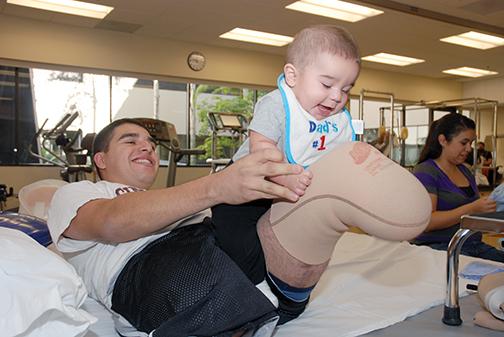Before 26-year-old psychology freshman Julian Torres was a student at San Diego State, he served five years as a Marine and fought in Marjah, Afghanistan. After being in Afghanistan for only three weeks, Torres stepped on an Improvised Explosive Device.
“When I got hit, I went straight up, saw my shadow and landed right on my face,” Torres said. “I remember everything about that day. I was conscious until they put me to sleep on the surgical bed.”
Torres lost his legs from the explosion and now has prosthetic legs.
Positive attitude
Losing both legs in the blink of an eye would be hard for even the most positive of people, butTorres has more than just a positive attitude; he integrates optimism into his everyday life through three steps.
“One, get radical with your self-talk,” Torres said. “Two, surround yourself with people that are ahead of you, and not only ahead of you, but they expect you to catch up to them. Three, you’ve got to give back; you’ve got to have human interaction,”
This positive attitude has helped not only mentally, but also physically.
“I can say having the right mindset is critical because I had 12 surgeries—most guys with my injury have 100 surgeries. I lost 70 percent of my hearing, but I got it all back,” Torres said. “I credit that to an unwavering optimism that it’s going to be OK.”
Torres was recently selected to receive a home built for him by the charity Homes For Our Troops, which builds houses for service members who have been severely injured. The houses have wider hallways and doorways, lower counters and handicap-friendly bathrooms.
Torres originally requested to have a house in San Diego, but HFOT said it could be a challenge and he may have to wait for a while. However, soon after that, HFOT found a spot for him and his family. Torres credits this opportunity to his positive mindset.
Giving back
Torres is giving back by motivating others. He speaks to private companies, churches, schools and amputee support groups about his experience and what it takes to stay optimistic.
Torres was asked to speak to workers for a private defense contractor about a project involving IED detection. The project was already almost a year behind schedule.
“They wanted me to talk about a sense of urgency and the gravity of the situation,” Torres said. “Those guys just see what’s on the assembly line and not the big picture sometimes.”
Torres was a real life example of how their project could help service members, and said he doesn’t mind talking about his prosthetic legs or his injury.
[quote]“I wish more people asked me about how I lost my legs,” Torres said. “People need to know there is a legitimate war going on.”[/quote]
Influences and the future
Though he is currently studying psychology, Torres is also interested in English.
“Authors leave a legacy, and I would like to leave my mark on society,” Torres said. “I believe that literature is important because it can portray current events in an imaginative and creative way, and it can invoke emotions in people. Literature has the ability to speak beyond the grave.”
Torres said he loves how he feels he can have a relationship with an author of a book that was written hundreds of years ago. He cites Thomas Moore’s “Utopia” and George Orwell’s “1984” as favorite books of his.
Torres feels his role in life is to help people achieve and maintain a “champion mindset.” His injury has helped him appreciate what’s important in life.
[quote]“The hustle and bustle of life doesn’tget me in a rush,” Torres said. “I would love for people to feel what I feel everyday: true happiness.”[/quote]












